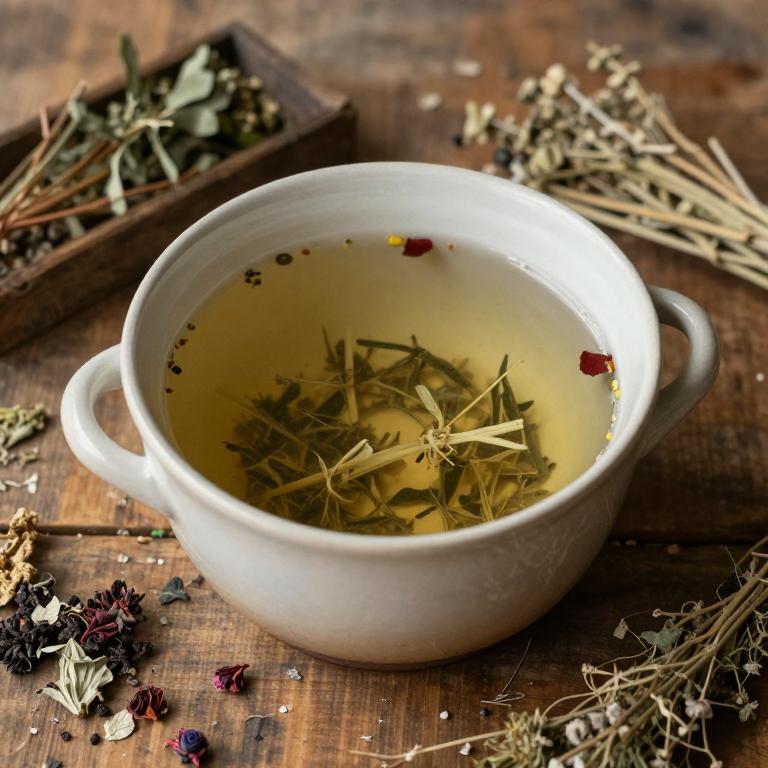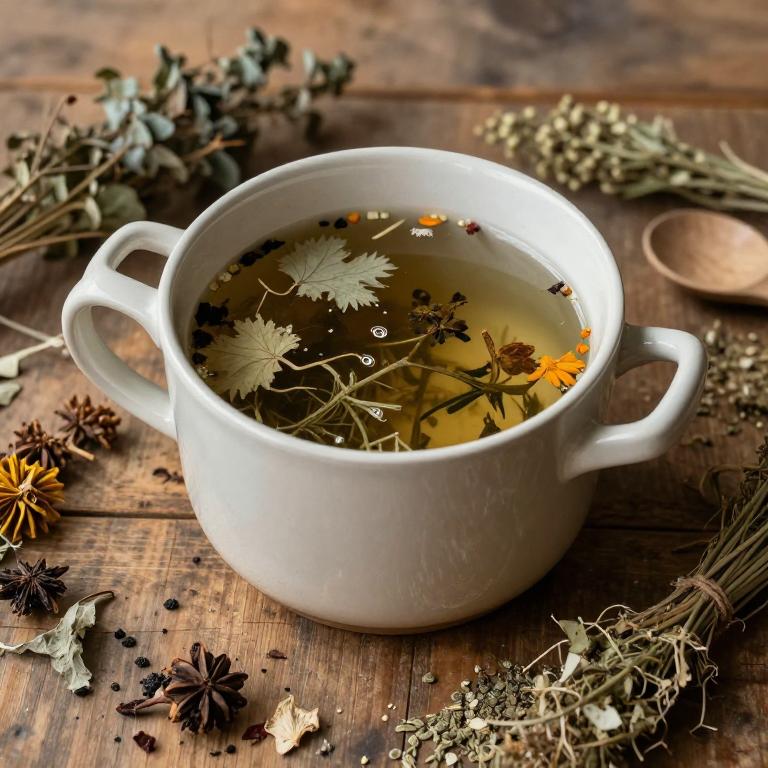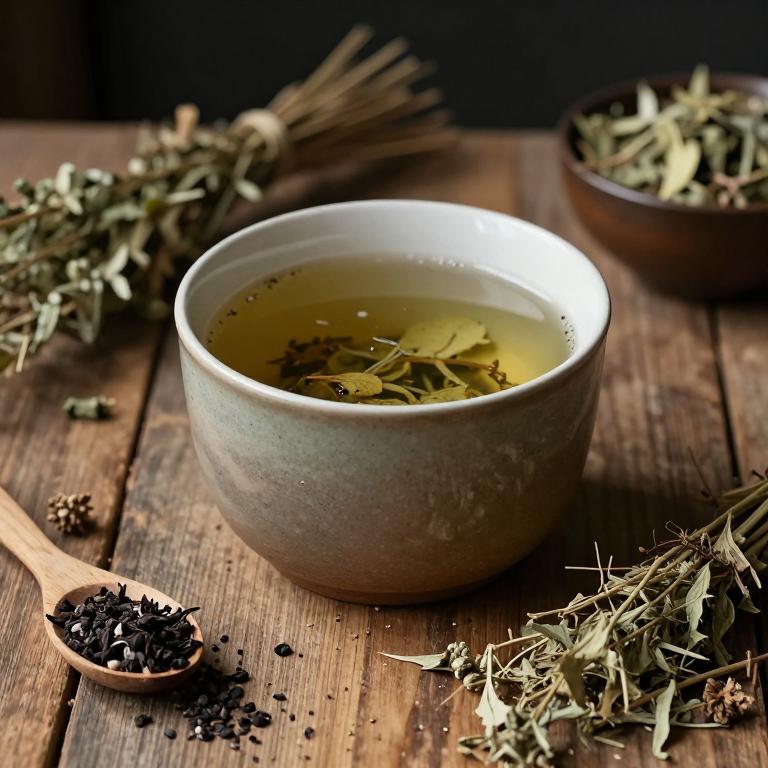10 Best Herbal Decoctions For Osteoporosis

Herbal decoctions have been traditionally used to support bone health and may offer potential benefits for individuals with osteoporosis.
These decoctions typically involve simmering a combination of herbs such as nettle, horsetail, and red clover in water to extract their medicinal properties. Some herbs are believed to enhance calcium absorption and stimulate bone formation, which can help in preventing bone loss. While herbal decoctions are generally considered safe, they should be used under the guidance of a healthcare professional to avoid interactions with medications.
Research on their efficacy for osteoporosis is ongoing, and they are often used as complementary therapies rather than replacements for conventional treatments.
Table of Contents
- 1. Black cohosh (Cimicifuga racemosa)
- 2. Thistle (Silybum marianum)
- 3. Chaste tree (Vitex agnus-castus)
- 4. Panax ginseng (Panax ginseng)
- 5. Yellow milkvetch (Astragalus membranaceus)
- 6. Salvia (Salvia officinalis)
- 7. Field horsetail (Equisetum arvense)
- 8. Ginger (Zingiber officinale)
- 9. Turmeric (Curcuma longa)
- 10. Licorice (Glycyrrhiza glabra)
1. Black cohosh (Cimicifuga racemosa)

Cimicifuga racemosa, commonly known as black cohosh, has been traditionally used in herbal medicine for its potential benefits in managing menopausal symptoms and bone health.
Herbal decoctions of Cimicifuga racemosa are prepared by simmering the dried root in water, allowing the active compounds to be extracted for consumption. Some studies suggest that compounds in this plant may help increase bone density by stimulating osteoblast activity and reducing bone resorption. However, while preliminary research shows promise, more rigorous clinical trials are needed to confirm its efficacy for osteoporosis treatment.
As with any herbal remedy, it is important to consult with a healthcare provider before use, especially for individuals with existing medical conditions or those taking other medications.
2. Thistle (Silybum marianum)

Silybum marianum, commonly known as milk thistle, has been explored for its potential role in managing osteoporosis through herbal decoctions.
The plant contains active compounds such as silymarin, which exhibit antioxidant and anti-inflammatory properties that may support bone health. Preliminary studies suggest that silymarin could enhance bone mineral density by promoting osteoblast activity and inhibiting osteoclast function. However, more clinical research is needed to confirm its efficacy and safety in treating osteoporosis.
While some traditional practices use milk thistle decoctions for bone-related conditions, it is advisable to consult a healthcare professional before incorporating it into a treatment plan for osteoporosis.
3. Chaste tree (Vitex agnus-castus)

Vitex agnus-castus, commonly known as chaste tree, has been traditionally used in herbal medicine for its potential effects on hormonal balance.
Recent studies suggest that its bioactive compounds may support bone health by influencing estrogen and progesterone levels, which are critical in maintaining bone density. Herbal decoctions made from Vitex agnus-castus are often prepared by simmering the dried berries in water, and they are typically consumed as a tea or tincture. While some research indicates that Vitex may help reduce the risk of osteoporosis, particularly in postmenopausal women, more clinical trials are needed to confirm its efficacy and safety.
As with any herbal remedy, it is advisable to consult a healthcare professional before using Vitex agnus-castus for osteoporosis management.
4. Panax ginseng (Panax ginseng)

Panax ginseng, a traditional herbal remedy, has been studied for its potential benefits in managing osteoporosis due to its ability to enhance bone density and improve bone metabolism.
Herbal decoctions of Panax ginseng typically involve soaking the root in water and simmering it to extract its active compounds, such as ginsenosides, which are believed to have anti-inflammatory and antioxidant properties. Research suggests that these decoctions may stimulate osteoblast activity and inhibit osteoclast activity, thereby promoting bone formation and reducing bone resorption. However, while some clinical trials show promising results, more rigorous studies are needed to confirm its efficacy and safety in treating osteoporosis.
As with any herbal treatment, it is advisable to consult a healthcare professional before incorporating Panax ginseng decoctions into a treatment plan.
5. Yellow milkvetch (Astragalus membranaceus)

Astragalus membranaceus, a traditional Chinese medicinal herb, has been studied for its potential role in the prevention and treatment of osteoporosis due to its immunomodulatory and anti-inflammatory properties.
Herbal decoctions made from astragalus membranaceus are often used in conjunction with other herbs to enhance bone density and reduce the risk of fractures. Research suggests that the polysaccharides and flavonoids in astragalus may stimulate osteoblast activity and inhibit osteoclast-mediated bone resorption. Clinical trials have shown promising results in improving bone mineral density in postmenopausal women and elderly patients.
However, further large-scale studies are needed to establish its efficacy and optimal dosage for osteoporosis management.
6. Salvia (Salvia officinalis)

Salvia officinalis, commonly known as sage, has been traditionally used in herbal medicine for its potential health benefits, including support for bone health.
Recent studies suggest that compounds found in sage, such as rosmarinic acid and flavonoids, may help increase bone density and reduce oxidative stress, which are key factors in the development of osteoporosis. Herbal decoctions made from dried sage leaves are often prepared by simmering the plant in water for an extended period to extract its active components. These decoctions are believed to enhance calcium absorption and promote collagen synthesis, both of which are essential for maintaining strong and healthy bones.
While more clinical research is needed, preliminary findings indicate that Salvia officinalis may serve as a complementary therapy in the management of osteoporosis.
7. Field horsetail (Equisetum arvense)

Equisetum arvense, commonly known as field horsetail, has been traditionally used in herbal medicine for its high silica content, which is believed to support bone health.
Herbal decoctions of Equisetum arvense are prepared by simmering the dried plant material in water, often combined with other bone-supporting herbs to enhance efficacy. Some studies suggest that the silica in horsetail may promote collagen synthesis and bone density, making it a potential complementary therapy for osteoporosis. However, due to its high concentration of silica and potential for toxicity if consumed in large amounts, it is important to use Equisetum arvense under the guidance of a qualified herbalist or healthcare provider.
While preliminary research is promising, more clinical trials are needed to fully establish its safety and effectiveness for osteoporosis management.
8. Ginger (Zingiber officinale)

Zingiber officinale, commonly known as ginger, has been traditionally used in herbal medicine for its potential health benefits, including its role in managing osteoporosis.
Studies suggest that ginger contains bioactive compounds such as gingerol and shogaol, which may help in enhancing bone density and reducing inflammation associated with bone loss. Herbal decoctions made from fresh or dried ginger root are often prepared by simmering the root in water to extract these beneficial compounds. These decoctions are believed to support bone health by promoting circulation and reducing oxidative stress, which are key factors in the development of osteoporosis.
While more research is needed, preliminary evidence indicates that ginger-based herbal decoctions could be a complementary therapy in the management of osteoporosis.
9. Turmeric (Curcuma longa)

Curcuma longa, commonly known as turmeric, has been widely studied for its potential therapeutic effects on osteoporosis due to its active compound, curcumin.
Herbal decoctions made from Curcuma longa are prepared by boiling the rhizomes in water to extract bioactive compounds, which are believed to have anti-inflammatory and antioxidant properties. These properties may help in reducing bone resorption and promoting bone formation, thus supporting bone density. Research suggests that curcumin can modulate pathways involved in osteoclast activity and may enhance the effectiveness of conventional osteoporosis treatments.
However, more clinical studies are needed to fully establish the efficacy and optimal dosage of Curcuma longa decoctions in managing osteoporosis.
10. Licorice (Glycyrrhiza glabra)

Glycyrrhiza glabra, commonly known as licorice root, has been traditionally used in herbal medicine for its anti-inflammatory and immune-modulating properties.
Recent studies suggest that its active compounds, such as glycyrrhizin and flavonoids, may contribute to bone health by enhancing osteoblast activity and inhibiting osteoclast-mediated bone resorption. Herbal decoctions made from Glycyrrhiza glabra are often combined with other bone-supporting herbs like calcium-rich plants or adaptogens to improve their efficacy in managing osteoporosis. However, long-term use of licorice root can lead to side effects such as hypertension and fluid retention due to its mineralocorticoid-like effects, necessitating careful monitoring.
Despite these considerations, Glycyrrhiza glabra decoctions show promise as a complementary therapy in the holistic management of osteoporosis.